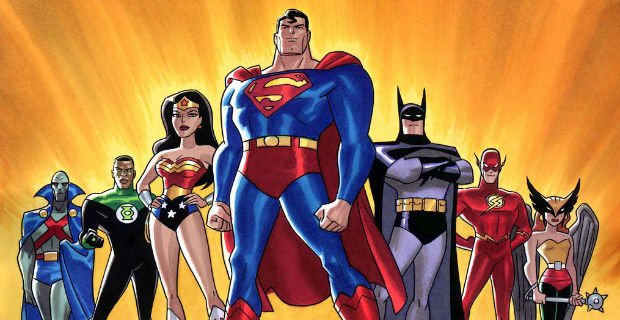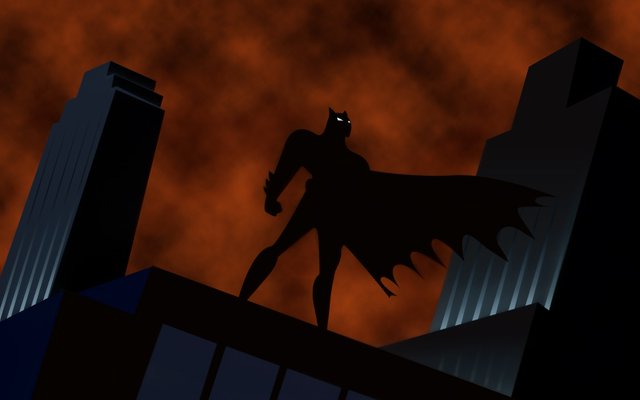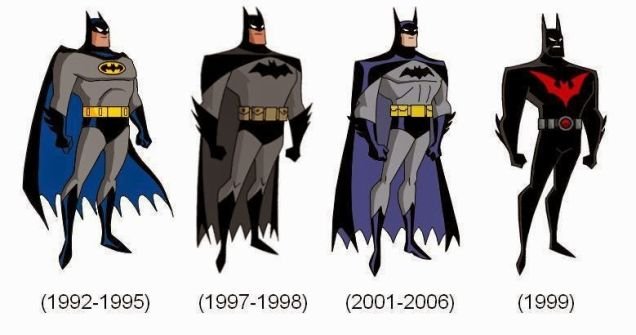Netflixing: Justice League
Sorry to do two DC properties in a row, but after examining the current options in my queue, this show quickly took precedence.
How did it do? Let's find out.

Something to Note, Before We Begin
This review will not be covering the sequel series, Justice League Unlimited. Netflix treats these as two different shows, so, therefore, I must as well. Furthermore, there is a distinct difference in quality between the two, so a review of one does not necessarily transpose onto the other.s
But I will be comparing them, from time to time.
The End of an Era
The DC animated universe is celebrated amongst fans of comic books, superheroes, and good storytelling in general. The shows that were produced throughout the 1990s are fondly remembered and still often heralded as some of the best examples of any entertainment produced by DC comics.

Beginning with Batman: The Animated Series (which many still regard as the best Batman adaptation ever), the animated offerings gave delight to casual and hardcore nerds alike. There was just something magical about the way these shows were made. After Batman's solo run, Superman: The Animated Series carried on the legacy, and though it was not as edgy or avant garde as its predecessor, it is still one of the most definitive versions of the Superman mythos, and many people prefer it to any of the cinematic Superman offerings.

As this was happening, the animated Batman shows were being updated to integrate into Superman's universe. This included a revamping of the art style (which was a step backward) as well as an attempt to harmonize the tone between the two heroes. This caused some strife and trouble, as the all-knowing network executives made ridiculous demands from the showrunners, requiring them to make Batman more toyetic and insisting that Robin appear in every episode ("Because that's what the kids want," said the white-haired CEO while rolling a cigar between his thick fingers).
But despite that, and despite a noticeable drop in quality in the later Batman seasons, the showrunners still managed to sneak in a few home-run episodes amongst the more commercialized slate.
To put it simply, in the 1990s, we were given a standard by which to judge future incarnations of both Batman and Superman.
And so, naturally, the creatives at DC were eager for this trend to continue, even after the original networks turned their back on the universe.
In Steps Cartoon Network

At this point in history, Cartoon Network was known for taking chances to make great entertainment, and so they were eager to pick up a successful franchise that non-cable networks had foolishly dropped.
This time around, they were going to try for the brass ring and create an animated series based on not just one hero, but the entire Justice League.
Such an endeavor had not been attempted since the days of Super Friends, whose reruns were often seen on Cartoon Network before they invented Boomerang.
Paul Dini and Bruce Timm were brought on board. This was finally happening.
The Result

Unfortunately, Cartoon Network's approach to Justice League ran along the lines of "Let's give the world a show just as great as the previous ones, but without paying the same price."
There were a lot of corners cut in the making of Justice League, in the animation, storyboarding, writing and other aspects. And while there is still much to celebrate here, the show, as a whole, serves as a cautionary tale against those who think they can have a free lunch.
The Writing
The writing is done poorly well.
What do I mean?
I mean that the writing is divided. The scenario writing is all done extremely well. The stories that are being told are grandiose yet personal, much like what we saw in earlier DCAU offerings.
But the dialogue writing is stilted, harrowing, and perplexing. It gets better towards the end of the series, but never quite makes a full recovery.
I got the feeling, while watching the show, that Bruce Timm and Paul Dini wrote the outlines for every episode (the scenario writing). But when those outlines were fleshed out, it feels like this was done by a team of maybe five or six people, with only two decent writers in the bunch. Since the problems began to fade in later episodes, I got the impression that the lackluster writers in the group either got better (by working with such good examples) or they were dismissed.
The Action
The action in this show was extremely limited. It was mostly limited to punching and kicking. There is very little of what I like to call "Power Exhibitionism", by which I mean action scenes where the heroes use their powers in cool ways.
This is in direct contrast to Justice League Unlimited, where it seems like every action sequence has the heroes doing something clever or doing some kind of trick shots with their various abilities.
Overall, the action in Justice League was a bust. From what I saw, it seems like the showrunners were hampered in what they could do, because the animation company just wasn't skilled enough to pull of more elaborate action sequences. This wouldn't be so bad for most animated shows, but when it's a show based on a DC property, you need to do more than have the characters throw punches.
A Question of Continuity
Justice League and its sequel series are the tail end of the original DCAU continuity. The DC shows that came afterward, such as Teen Titans, Young Justice, Green Lantern, and Batman: the Brave and the Bold, don't reference it and are not bound by the chain of events therein.
This is a little sad, to me, since it means that there is no direct line from today's shows back to the greats of the 1990s. Still, that continuity had to end somewhere.
When people reference the DCAU nowadays, they are usually talking about one of the new continuities (there are several), and those universes have a lot of good things in them. Young Justice in particular is noteworthy, and it actually tries to tie itself in to the 1990s shows, though it ignores the existence of Justice League.
So I was disappointed to discover that the show I was watching this week was basically overruled by later shows. It made the experience just a little less magical.
My Judgment
There are a lot of good episodes in Justice League (the Christmas special was particularly enjoyable, for one). However, it leaves a lot to be desired. And the showrunners obviously realized this because they eventually reinvented the show to make its sequel series, which is far superior.
I will say, however, that there was something to be said for having a smaller cast in the earlier series. There are only seven members in this league, and it allowed for a lot of intimate moments between them, though the crummy dialogue negated much of that.
It's a must-watch if you are going to proceed to Unlimited. Otherwise, the best you can do is beg Netflix to pick up Batman: The Animated Series, because why on Earth haven't they already done so?
Image Citations
- The gang's all here. Source: Justice League promotional image
- "Because I'm Batman!!!". Source: Batman: The Animated Series
- Batmen. Source: DC Animated Universe
- Logo. Source: Cartoon Network
- Lineup. Source: Justice League
Previous entries in the Netflixing series:
TV Shows
Movies
Although Batman: The Animated Series is without a doubt, THE best animated depiction of Batman ever, I've never quite gotten into Justice League; partly due to the fact I'm used to Batman just working with "his own people" as opposed to a group of superheroes; though several have made guest appearances on the show. But in the case of Justice League, I think the reason the writing suffered(despite some standout episodes) was due to executive meddling on Warner Bros part. Had they let the creators do their thing, the show would've excelled in it' earlier seasons. At least it's sequel series did much better. Great article!!
It is often difficult to reconcile Batman's world with the rest of the DC universe.
A great example of this is how Nolan's Batman was unable to be folded into an extended continuity with Superman and the others. Yes, Nolan himself was adamantly against such a move, but it would never have worked, regardless. Nolan's trilogy went for a "true crime" angle and tried to dispose of the fantasy elements, as much as was possible.
But no matter what angle the showrunners are going for, the fact remains that Batman is bound to lose some of his "specialness" when paired with people who can lift and throw mountains and buildings. This is one of the reasons why Justice League Unlimited stands out so much: it made Batman indispensable to the idea of a united superhero organization. It was a series of mystery stories where Batman was always two steps ahead of everyone else, even while laboring to make everyone else also look like titans in their own ways.
The original DCAU continuity should be mandatory study materials for anyone seeking to master serial storytelling.
Thank you for commenting. I always appreciate feedback.
Batman Begins had fantasy elements, but what makes it brilliant was that it was tied to a central theme; that is fear and the perfect antagonist to hit home such a theme was the Scarecrow. That's one of the reasons why it worked so perfectly. Part of what makes Batman so special is his human intellect combined with physical prowess and tactical decision making and yes I agree that when he's paired up with other superheroes, he loses his "specialness". I think that's probably why Batman Vs Superman: Dawn Of Justice wasn't as well received; especially from audiences. It wasn't the physical action that made these characters resonate with readers of the comics, but rather the ideologies that clash among the respected heroes; something Dawn of Justice failed to do because Zack Snyder focused more on the action than character development. A lot of people seem to be hating on the film; some for legitimate and asinine reasons. And you're right. People enjoy the animated depictions of Justice League more than Dawn of Justice because despite some schlocky writing, it was the character dynamics that made them fun to watch. I hope DC's cinematic universe improves for the better because Marvel is beating them to the punch.